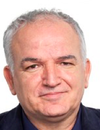00:00 | Soft Electronics For Noninvasive Healthcare: From the Skin to Below the Skin
Sheng Xu, Assistant Professor, University of California, San Diego, United States of America
Soft electronic devices that can acquire vital signs from the human body represent an important trend for healthcare. Combined strategies of materials design and advanced microfabrication allow the integration of a variety of components and devices on a stretchable platform, resulting in systems with minimal constraints on the human body. We have demonstrated a skin-mounted multichannel health monitor that can sense local field potentials, temperature, strain, acceleration, and body orientation. Integrating ultrasonic transducers on this stretchable platform adds a third dimension to the detection range by launching ultrasound waves that reach well underneath the skin. The ultrasound waves allow capturing a wide range of dynamic events in deep tissues such as blood pressure and blood flow waveforms in central arteries and veins. This technology holds profound implications for continuous and noninvasive sensing, diagnosis, and treatment of chronic diseases. |
00:00 | Small Sensors Go Big: Towards High-Resolution Monitoring of Industrial Fermentations
Helena Junicke, Marie-Curie Researcher, Technical University of Denmark, Denmark
Miniaturized sensors provide new opportunities for industrial fermentation control. In this frequently overlooked application, sensors allow for an improved spatial surveillance of production units, leading to increased performance and lower risk of failure. |
00:00 |  | Keynote Presentation Title to be Confirmed.
Joseph Wang, Chair of Nanoengineering, SAIC Endowed Professor, Director at Center of Wearable Sensors, University of California-San Diego, United States of America
|
|
00:00 | Sensors for Biosensors: Efficient Strategies Towards Successful Screening and Commercialization
Daria Semenova, Researcher, Technical University of Denmark, Denmark
Novel strategies towards biosensor design optimization based on combining the results of multi-analytical studies together with the mathematical modelling should be integrated. Moreover, the development of the database platforms for the available sensing technologies should be promoted for further progress in biosensorics. |
00:00 |  | Keynote Presentation Title to be Confirmed.
Arben Merkoçi, ICREA Professor and Director of the Nanobioelectronics & Biosensors Group, Institut Català de Nanociencia i Nanotecnologia (ICN2), Barcelona Institute of Science and Technology (BIST), Spain
|
|

